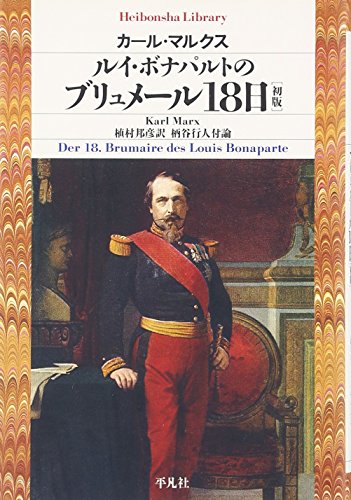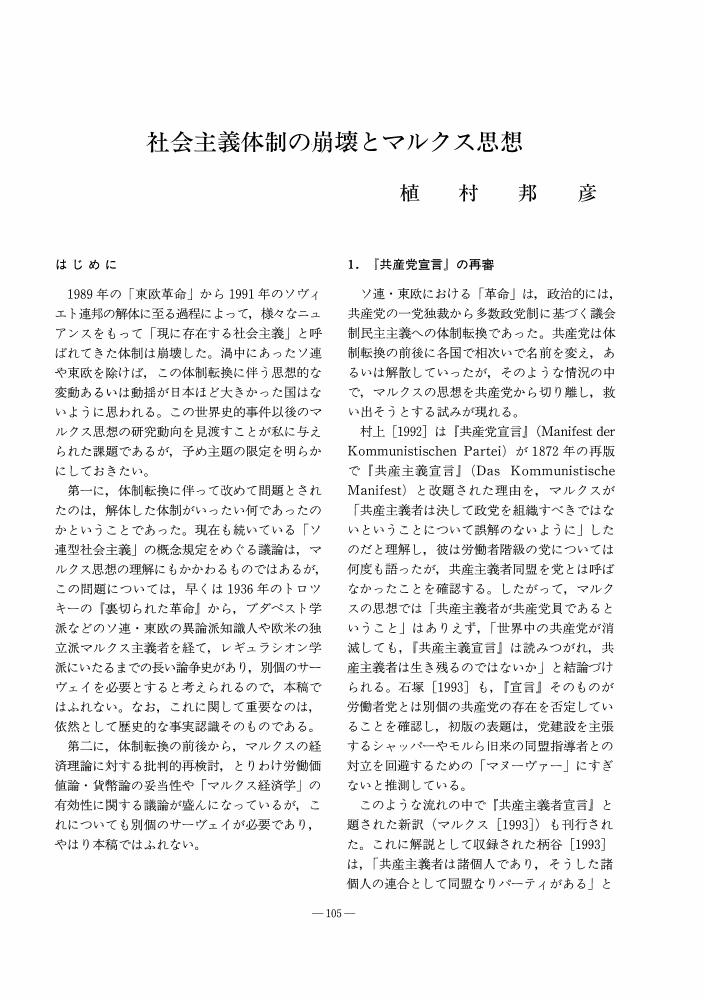6 0 0 0 IR 重層的決定と偶然性 : あるいはアルチュセールの孤独(経済学部創設100周年記念特輯)
- 著者
- 植村 邦彦
- 出版者
- 関西大学
- 雑誌
- 關西大學經済論集 (ISSN:04497554)
- 巻号頁・発行日
- vol.54, no.3, pp.337-354, 2004-11-11
ルイ・アルチュセール(1918-1990)は、1960年代に「重層的決定」や「構造的因果性」という概念をマルクス主義に導入することによって、ヘーゲル主義的マルクス主義や実存主義的マルクス主義を批判し、マルクス主義内部での「認識論的切断」を理論化しようとした思想家であり、フランスだけでなく世界的に大きな影響を与えた。しかし、この試みは、思想的言説空間では「構造主義」や「ポスト構造主義」へと向かうマルクス離れに棹さし、アルチュセール自身も、晩年には「偶然性」や「出会い」の理論化を模索しつつ、マルクス主義への批判を表明するにいたった。本稿は、このようなアルチュセールの理論的模索の全体像を明らかにし、その意味を確認しようとするものである。
5 0 0 0 OA マルクスにおける歴史認識の方法 :『ルイ・ボナパルトのブリュメール18日』をめぐって
- 著者
- 植村 邦彦
- 出版者
- 關西大学經済學會
- 雑誌
- 關西大學經済論集 (ISSN:04497554)
- 巻号頁・発行日
- vol.47, no.5, pp.481-510, 1997-12-25
マルクスの数多い著作の中でも、1852年に書かれた『ルイ・ボナパルトのブリュメール18日』ほど、これまでに様々な読まれ方をしてきたテクストはないだろう。たとえばエドワード・サイードは、文学批評の方法を論じたエッセイの中で小説と「情況的現実」との関係を論じながら、やや唐突に次のように述べている。「しかしながら、いかなる小説家も、『ルイ・ボナパルトのブリュメール18日』を書いたときのマルクスほどに現実的情況について明確な態度を取ることはできないだろう。私から見れば、現実的情況が甥[ルイ・ボナパルト]を革新者としてではなくて、偉大な叔父[ナポレオン]の笑劇的な反復者として仕立て上げたことを示すときの筆法の正確さがこれほどに才気あふれ、これほどに圧倒的な力をもって迫ってくる著作はない(1)」。サイードが強調する第一点は、「マルクスの方法にとって言語や表象は決定的な重要性を持って」おり、「マルクスがあらゆる言語上の工夫を活用していることが『ブリュメール18日』を知的文献のパラダイムたらしめ(2)」ているということであり、第二は、ナポレオン伝説によって育まれた「実にひどい過ち」を修正するために、「書き換えられた歴史は再び書き換えることが可能であることを示」そうとするマルクスの「批評的意識(3)」である。こうして、マルクスにおけるレトリックという問題が設定される。あるいは、「オウムと世界最終戦争」という副題をもつ著書『虚構の時代の果て』の「あとがき」で、大澤真幸はこう述べている。「民主主義体制の下で極端な独裁が国民の広範な支持を獲得できたのはなぜか。マルクスは、この人物、ルイ・ボナパルト(ナポレオン三世)のク・デタが人民投票で承認された直後に、彼が政権を獲得するまでの過程を社会学的に考察する『ルイ・ボナパルトのブリュメール18日』を著している。今日でもなお、マルクスのこの議論は、ボナパルトが成功しえた理由についての、最も説得力ある分析であろう。ちょうどこのマルクスの分析のような、私たちが内属している『オウム』という文脈に対する透徹した考察が必要である(4)」。ここでは、マルクスのこの書は、「考察する者自身が内属している<現在>」に関する「社会学的考察」の模範例とみなされている。このような『ブリュメール18日』の読み方は、言うまでもなく、「マルクス主義」の側からの正統的な読み方とはかなり異なる。マルクスの死後まもない1885年に、エンゲルスはこの書の第三版に付した序文で、次のような位置づけを試みているからである。「マルクスこそ、歴史の運動の大法則をはじめて発見した人であった。この法則によれば、すべて歴史上の闘争は、政治、宗教、哲学、その他どんなイデオロギー的分野でおこなわれようと、実際には、社会諸階級の闘争の――あるいはかなりに明白な、あるいはそれほど明白でない――表現にすぎない。そして、これらの階級の存在、したがってまた彼らのあいだの衝突は、それ自体、彼らの経済状態の発展程度によって、彼らの生産、およびこの生産に条件づけられる交換の仕方によって、条件づけられているのである。……マルクスは、ここでこの[フランス第二共和制の]歴史によって自分の法則を試験したのであって、彼はこの試験に輝かしい成績で合格した、と言わざるをえないのである(5)」。この見方によれば、『ブリュメール18日』は「唯物論的歴史観の定式」の一つの例示だということになる。本稿の課題は、『ルイ・ボナパルトのブリュメール18日』に関する最近の注目すべきいくつかの「読み方」の批判的検討を通して、マルクスの思想の展開の中に占める『ブリュメール18日』の位置づけを明らかにすることにある。マルクスにおける歴史認識の方法、それがテーマとなる。
5 0 0 0 OA 通電加熱の基礎と応用
- 著者
- 植村 邦彦
- 出版者
- 公益社団法人 日本食品科学工学会
- 雑誌
- 日本食品科学工学会誌 (ISSN:1341027X)
- 巻号頁・発行日
- vol.50, no.4, pp.151-156, 2003-04-15 (Released:2009-02-19)
- 参考文献数
- 19
- 被引用文献数
- 1
4 0 0 0 OA 価値意識としての「国民的アイデンティティ」
- 著者
- 植村 邦彦
- 出版者
- 関西大学経済・政治研究所
- 雑誌
- 価値変容と社会経済システム
- 巻号頁・発行日
- pp.185-211, 1999-03
チェチェンの分離独立運動への武力介入に動員され、苛烈な戦闘を経験して帰還したロシア軍兵士の間に、「チェチェン症候群」と呼ばれる精神的混乱が広がっている。アフガンとは違って、「相手は同じ言葉を話し、同じ国に属する人々だった」ことが要因の一つだという(1997年2月19日付朝日新聞)。旧ユーゴスラビアの内戦においても、おそらく同じような「症候群」は存在しただろう。同じ言語(セルボ=クロアチア語)を話す、同じ「国民nation」だった人々が、異なる「民族ethnic group」として敵対する。ここ数年にわたって私たちが目撃してきたのは、国際的な階級的連帯を大義としたはずの「社会主義」の幕が下りた後、一つの国家がいくつもの「民族」に解体し、「国民的アイデンティティ」がより小さな規模で新たに再構築されていく姿である。ひとをかつての同胞殺しへと駆り立てる「民族」あるいは「国民」とは、いったい何なのだろうか。「民族/国民」や「ナショナリズム」をどのように理解すべきかという問題は、19世紀と20世紀を通していまなお最大の思想的課題であり続けている。欧米では、「nation, nationality, ethnicity」や「nationalism」に関する研究の蓄積を経て、近年では、「国民nation」を資本主義世界システム内部で形成された「想像の共同体」あるいは「虚構のエスニシティ」ととらえる画期的な研究が現れている。本論文は、近代における「国民的アイデンティティ」の形成を、「想像の共同体/虚構のエスニシティ」の形成という問題視角から検討し、そのうえで、「国民」間の価値序列意識と「国民的アイデンティティ」とがどのように接合しているかを明らかにしようとするものである。そのために、まず最初に、「国民」と「国民的アイデンティティ」をめぐる様々な理論的アプローチを整理し、方法的概念を明確にすることにしたい。これらの研究は、とりわけ1980年代以降には、「人種主義」や「エスニシティ」に関する研究とも重なり合う形で活況を呈しているので、後者に関する理論的アプローチの検討も不可欠になる。第二に、こうして獲得された方法的概念を用いて、「国民」間の価値序列意識と「国民的アイデンティティ」との接合を、近代日本の事例に即して具体的に明らかにしたい。この場合、「国民」意識の形成と「西洋」認識との関連が問題となるはずである。最後に、「国民的アイデンティティ」の中核をなす「ナショナリティ」意識の変容の可能性について、「ナショナリティの脱構築」を掲げる最近の研究を手がかりとして考えてみることにしたい。
- 著者
- 植村 邦彦
- 出版者
- 熊本大学
- 雑誌
- 文学部論叢 (ISSN:03887073)
- 巻号頁・発行日
- vol.9, pp.57-82, 1982-11-30
4 0 0 0 OA 新しい「帝国」概念の有効性―ハートとネグリの『帝国』をめぐって―
- 著者
- 植村 邦彦
- 出版者
- 関西大学経済・政治研究所
- 雑誌
- 多元的経済社会の展開
- 巻号頁・発行日
- pp.19-48, 2003-03-31
一つの妖怪が世界をうろついている。「帝国」という妖怪が。すでに1997年には、極東の片隅でもこう言われていた。「帝国の到来をめぐる予言が今日ほどさかんだったことはない。しかもそれは、一地域における帝国の誕生ではなく、世界帝国とも言うべきものの出現である(1)」。この「世界帝国」の表象について、『帝国とは何か』の編者の一人である増田一夫は、次のように説明している。「われわれの目前で成立しつつあるかもしれないとされる帝国は、武力制覇によって成立するのでもなく、中心的な核もなく、あくまで匿名であり続けると言われている。このイメージは政治よりも経済、経済よりもコミュニケーションの分野で実際に起こっている事態を想起させる。ピラミッドや樹[ツリー]状の組織ではなく、無限に接続し合い絡み合うウェブもしくはネットワーク。あらゆる地点からのランダム・アクセスの可能性を備えた開かれたシステム。根茎[リゾーム]状の組織。これはドゥルーズとガタリの著作『資本主義と分裂症』において提示されたイメージにほかならない(2)」。そのように述べたうえで、増田は次のように結論を保留している。「そして『帝国』。その到来の予感は、一部の人々の期待を代弁しているにすぎないのかもしれない。……しかし『帝国』は、たんに、国民国家が弱体化してゆくなか、その崩壊の後に来る事態を『混沌』と呼ぶのを忌避して用いられる名にすぎないのかもしれない(3)」。このような叙述からわかるように、最近現れた「帝国」という言説は、イマニュエル・ウォーラーステインによって提起された資本主義「世界システム」論やその上部構造としての「インターステイト・システム」論に取って代わる、新しい世界認識の概念として論じられているのであって、従来の「帝国主義」論や「帝国主義の問題を『意識』に即して見ること(4)」をテーマとする「帝国意識」論とは問題関心が基本的に異なると考えるべきであろう。本論文は、このような意味での「帝国」論の最新の成果であり、2000年にアメリカで出版されるとすぐに大きな話題を呼んだマイケル・ハートとアントニオ・ネグリの共著『帝国(5)』を取り上げ、その内容を紹介したうえで、その理論的な有効性について考えようとするものである。
3 0 0 0 IR 価値意識としての「国民的アイデンティティ」
- 著者
- 植村 邦彦
- 出版者
- 関西大学経済・政治研究所
- 雑誌
- 価値変容と社会経済システム
- 巻号頁・発行日
- pp.185-211, 1999-03
チェチェンの分離独立運動への武力介入に動員され、苛烈な戦闘を経験して帰還したロシア軍兵士の間に、「チェチェン症候群」と呼ばれる精神的混乱が広がっている。アフガンとは違って、「相手は同じ言葉を話し、同じ国に属する人々だった」ことが要因の一つだという(1997年2月19日付朝日新聞)。旧ユーゴスラビアの内戦においても、おそらく同じような「症候群」は存在しただろう。同じ言語(セルボ=クロアチア語)を話す、同じ「国民nation」だった人々が、異なる「民族ethnic group」として敵対する。ここ数年にわたって私たちが目撃してきたのは、国際的な階級的連帯を大義としたはずの「社会主義」の幕が下りた後、一つの国家がいくつもの「民族」に解体し、「国民的アイデンティティ」がより小さな規模で新たに再構築されていく姿である。ひとをかつての同胞殺しへと駆り立てる「民族」あるいは「国民」とは、いったい何なのだろうか。「民族/国民」や「ナショナリズム」をどのように理解すべきかという問題は、19世紀と20世紀を通していまなお最大の思想的課題であり続けている。欧米では、「nation, nationality, ethnicity」や「nationalism」に関する研究の蓄積を経て、近年では、「国民nation」を資本主義世界システム内部で形成された「想像の共同体」あるいは「虚構のエスニシティ」ととらえる画期的な研究が現れている。本論文は、近代における「国民的アイデンティティ」の形成を、「想像の共同体/虚構のエスニシティ」の形成という問題視角から検討し、そのうえで、「国民」間の価値序列意識と「国民的アイデンティティ」とがどのように接合しているかを明らかにしようとするものである。そのために、まず最初に、「国民」と「国民的アイデンティティ」をめぐる様々な理論的アプローチを整理し、方法的概念を明確にすることにしたい。これらの研究は、とりわけ1980年代以降には、「人種主義」や「エスニシティ」に関する研究とも重なり合う形で活況を呈しているので、後者に関する理論的アプローチの検討も不可欠になる。第二に、こうして獲得された方法的概念を用いて、「国民」間の価値序列意識と「国民的アイデンティティ」との接合を、近代日本の事例に即して具体的に明らかにしたい。この場合、「国民」意識の形成と「西洋」認識との関連が問題となるはずである。最後に、「国民的アイデンティティ」の中核をなす「ナショナリティ」意識の変容の可能性について、「ナショナリティの脱構築」を掲げる最近の研究を手がかりとして考えてみることにしたい。
2 0 0 0 ルイ・ボナパルトのブリュメール18日 : 初版
2 0 0 0 OA マルクス研究の現在
- 著者
- 植村 邦彦
- 出版者
- The Japanese Society for the History of Economic Thought
- 雑誌
- 経済学史学会年報 (ISSN:04534786)
- 巻号頁・発行日
- vol.45, no.45, pp.66-77, 2004 (Released:2010-08-05)
- 参考文献数
- 48
In 1998, the one-hundred-and-fiftieth anniversary of the publication of the Communist Manifesto was celebrated in many “developed” countries. An international conference was held in Paris in May, several new editions of the Communist Manifesto were published, and many journals published special issues. Since then, various Marx readers, and several Marx dictionaries and many books on Marx have been published. Marx-studies seem to be renewed.Readings of Marx change with changing historical and political contexts. The collapse of the Soviet Union and the “actually existing socialism” has already had profound consequences in the world of ideas and in global politics. Many authors discuss Marx “after the fall of communism, ” “for a post-acommunist era, ” or “après les marxismes.” Marx is no longer necessarily the theorist of proletarian revolution. Rather he is now widely considered as a democrat against liberalism, or as the premier critical theorist of capitalist society.One of the focuses in contemporary Marx-studies is the relation between Hegel and Marx. While Althusserian Marxists and “Postmodernists” reject Hegelian inheritance in Marx, Hegelian Marxists insist the continuity between Hegel and Marx. While the former argues that Marx criticized Hegelian liberalism, the latter insists that Hegel was democratic as well as Marx. They, however, agree with each other that Marx was a democrat.Another focus is Marx's approach to ecology. While some argue that Marx was in favor of the human domination of nature, others insist that Marx's approach to nature, especially his concept of the metabolism between nature and society, provides original and useful insights into the environmental crisis under capitalism. Capitalism exploits not only human nature as labor power, but also nature itself as resources. As opposed to some ecologists' critiques, Marx aimed to abolish the alienation of labor and nature entirely. Red and Green can still go together.There have always been multiple Marxes, and each one is a product of a reading strategy. As there were multiple Marxes, so there were multiple debates. Re-reading and re-assessing Marx is itself an important way of thinking and doing, but is also a way of reconstructing a Marx at the same time. So we may not forget, as Terrell Carver says, that Marx is plural for us because our problems are plural.
- 著者
- 植村 邦彦
- 出版者
- 関西大学経済学会
- 雑誌
- 関西大学経済論集 (ISSN:04497554)
- 巻号頁・発行日
- vol.59, no.4, pp.17-33, 2010-03
英語の〈civil society〉は、16世紀末から使われ始めた言葉である。日本語では通常「市民社会」と訳されているが、この言葉は本来アリストテレス『政治学』における「国家共同体」の訳語として英語に導入されたものであり、17世紀のホッブズとロックにいたるまで、この意味で使われた。この言葉の前史と初出時の語義を確認することが、本稿の課題である。
2 0 0 0 OA マルクスにおける歴史認識の方法―『ルイ・ボナパルトのブリュメール18日』をめぐって
- 著者
- 植村 邦彦
- 出版者
- 関西大学経済学会
- 雑誌
- 関西大学経済論集 (ISSN:04497554)
- 巻号頁・発行日
- vol.47, no.5, pp.481-510, 1997-12
マルクスの数多い著作の中でも、1852年に書かれた『ルイ・ボナパルトのブリュメール18日』ほど、これまでに様々な読まれ方をしてきたテクストはないだろう。たとえばエドワード・サイードは、文学批評の方法を論じたエッセイの中で小説と「情況的現実」との関係を論じながら、やや唐突に次のように述べている。「しかしながら、いかなる小説家も、『ルイ・ボナパルトのブリュメール18日』を書いたときのマルクスほどに現実的情況について明確な態度を取ることはできないだろう。私から見れば、現実的情況が甥[ルイ・ボナパルト]を革新者としてではなくて、偉大な叔父[ナポレオン]の笑劇的な反復者として仕立て上げたことを示すときの筆法の正確さがこれほどに才気あふれ、これほどに圧倒的な力をもって迫ってくる著作はない(1)」。サイードが強調する第一点は、「マルクスの方法にとって言語や表象は決定的な重要性を持って」おり、「マルクスがあらゆる言語上の工夫を活用していることが『ブリュメール18日』を知的文献のパラダイムたらしめ(2)」ているということであり、第二は、ナポレオン伝説によって育まれた「実にひどい過ち」を修正するために、「書き換えられた歴史は再び書き換えることが可能であることを示」そうとするマルクスの「批評的意識(3)」である。こうして、マルクスにおけるレトリックという問題が設定される。あるいは、「オウムと世界最終戦争」という副題をもつ著書『虚構の時代の果て』の「あとがき」で、大澤真幸はこう述べている。「民主主義体制の下で極端な独裁が国民の広範な支持を獲得できたのはなぜか。マルクスは、この人物、ルイ・ボナパルト(ナポレオン三世)のク・デタが人民投票で承認された直後に、彼が政権を獲得するまでの過程を社会学的に考察する『ルイ・ボナパルトのブリュメール18日』を著している。今日でもなお、マルクスのこの議論は、ボナパルトが成功しえた理由についての、最も説得力ある分析であろう。ちょうどこのマルクスの分析のような、私たちが内属している『オウム』という文脈に対する透徹した考察が必要である(4)」。ここでは、マルクスのこの書は、「考察する者自身が内属している<現在>」に関する「社会学的考察」の模範例とみなされている。このような『ブリュメール18日』の読み方は、言うまでもなく、「マルクス主義」の側からの正統的な読み方とはかなり異なる。マルクスの死後まもない1885年に、エンゲルスはこの書の第三版に付した序文で、次のような位置づけを試みているからである。「マルクスこそ、歴史の運動の大法則をはじめて発見した人であった。この法則によれば、すべて歴史上の闘争は、政治、宗教、哲学、その他どんなイデオロギー的分野でおこなわれようと、実際には、社会諸階級の闘争の――あるいはかなりに明白な、あるいはそれほど明白でない――表現にすぎない。そして、これらの階級の存在、したがってまた彼らのあいだの衝突は、それ自体、彼らの経済状態の発展程度によって、彼らの生産、およびこの生産に条件づけられる交換の仕方によって、条件づけられているのである。……マルクスは、ここでこの[フランス第二共和制の]歴史によって自分の法則を試験したのであって、彼はこの試験に輝かしい成績で合格した、と言わざるをえないのである(5)」。この見方によれば、『ブリュメール18日』は「唯物論的歴史観の定式」の一つの例示だということになる。本稿の課題は、『ルイ・ボナパルトのブリュメール18日』に関する最近の注目すべきいくつかの「読み方」の批判的検討を通して、マルクスの思想の展開の中に占める『ブリュメール18日』の位置づけを明らかにすることにある。マルクスにおける歴史認識の方法、それがテーマとなる。
1 0 0 0 OA 重層的決定と偶然性 : あるいはアルチュセールの孤独
- 著者
- 植村 邦彦
- 出版者
- 關西大学經済學會
- 雑誌
- 關西大學經済論集 (ISSN:04497554)
- 巻号頁・発行日
- vol.54, no.3-4, pp.337-354, 2004-11-11
ルイ・アルチュセール(1918-1990)は、1960年代に「重層的決定」や「構造的因果性」という概念をマルクス主義に導入することによって、ヘーゲル主義的マルクス主義や実存主義的マルクス主義を批判し、マルクス主義内部での「認識論的切断」を理論化しようとした思想家であり、フランスだけでなく世界的に大きな影響を与えた。しかし、この試みは、思想的言説空間では「構造主義」や「ポスト構造主義」へと向かうマルクス離れに棹さし、アルチュセール自身も、晩年には「偶然性」や「出会い」の理論化を模索しつつ、マルクス主義への批判を表明するにいたった。本稿は、このようなアルチュセールの理論的模索の全体像を明らかにし、その意味を確認しようとするものである。
1 0 0 0 OA 新しい「帝国」概念の有効性 : ハートとネグリの『帝国』をめぐって
- 著者
- 植村 邦彦
- 出版者
- 関西大学経済・政治研究所
- 雑誌
- 多元的経済社会の展開
- 巻号頁・発行日
- pp.19-48, 2003-03-31
一つの妖怪が世界をうろついている。「帝国」という妖怪が。すでに1997年には、極東の片隅でもこう言われていた。「帝国の到来をめぐる予言が今日ほどさかんだったことはない。しかもそれは、一地域における帝国の誕生ではなく、世界帝国とも言うべきものの出現である(1)」。この「世界帝国」の表象について、『帝国とは何か』の編者の一人である増田一夫は、次のように説明している。「われわれの目前で成立しつつあるかもしれないとされる帝国は、武力制覇によって成立するのでもなく、中心的な核もなく、あくまで匿名であり続けると言われている。このイメージは政治よりも経済、経済よりもコミュニケーションの分野で実際に起こっている事態を想起させる。ピラミッドや樹[ツリー]状の組織ではなく、無限に接続し合い絡み合うウェブもしくはネットワーク。あらゆる地点からのランダム・アクセスの可能性を備えた開かれたシステム。根茎[リゾーム]状の組織。これはドゥルーズとガタリの著作『資本主義と分裂症』において提示されたイメージにほかならない(2)」。そのように述べたうえで、増田は次のように結論を保留している。「そして『帝国』。その到来の予感は、一部の人々の期待を代弁しているにすぎないのかもしれない。……しかし『帝国』は、たんに、国民国家が弱体化してゆくなか、その崩壊の後に来る事態を『混沌』と呼ぶのを忌避して用いられる名にすぎないのかもしれない(3)」。このような叙述からわかるように、最近現れた「帝国」という言説は、イマニュエル・ウォーラーステインによって提起された資本主義「世界システム」論やその上部構造としての「インターステイト・システム」論に取って代わる、新しい世界認識の概念として論じられているのであって、従来の「帝国主義」論や「帝国主義の問題を『意識』に即して見ること(4)」をテーマとする「帝国意識」論とは問題関心が基本的に異なると考えるべきであろう。本論文は、このような意味での「帝国」論の最新の成果であり、2000年にアメリカで出版されるとすぐに大きな話題を呼んだマイケル・ハートとアントニオ・ネグリの共著『帝国(5)』を取り上げ、その内容を紹介したうえで、その理論的な有効性について考えようとするものである。
1 0 0 0 IR マルクスにおける歴史認識の方法--「ルイ・ボナパルトのブリュメ-ル18日」をめぐって
- 著者
- 植村 邦彦
- 出版者
- 關西大学經済學會
- 雑誌
- 関西大学経済論集 (ISSN:04497554)
- 巻号頁・発行日
- vol.47, no.5, pp.481-510, 1997-12
マルクスの数多い著作の中でも、1852年に書かれた『ルイ・ボナパルトのブリュメール18日』ほど、これまでに様々な読まれ方をしてきたテクストはないだろう。たとえばエドワード・サイードは、文学批評の方法を論じたエッセイの中で小説と「情況的現実」との関係を論じながら、やや唐突に次のように述べている。「しかしながら、いかなる小説家も、『ルイ・ボナパルトのブリュメール18日』を書いたときのマルクスほどに現実的情況について明確な態度を取ることはできないだろう。私から見れば、現実的情況が甥[ルイ・ボナパルト]を革新者としてではなくて、偉大な叔父[ナポレオン]の笑劇的な反復者として仕立て上げたことを示すときの筆法の正確さがこれほどに才気あふれ、これほどに圧倒的な力をもって迫ってくる著作はない(1)」。サイードが強調する第一点は、「マルクスの方法にとって言語や表象は決定的な重要性を持って」おり、「マルクスがあらゆる言語上の工夫を活用していることが『ブリュメール18日』を知的文献のパラダイムたらしめ(2)」ているということであり、第二は、ナポレオン伝説によって育まれた「実にひどい過ち」を修正するために、「書き換えられた歴史は再び書き換えることが可能であることを示」そうとするマルクスの「批評的意識(3)」である。こうして、マルクスにおけるレトリックという問題が設定される。あるいは、「オウムと世界最終戦争」という副題をもつ著書『虚構の時代の果て』の「あとがき」で、大澤真幸はこう述べている。「民主主義体制の下で極端な独裁が国民の広範な支持を獲得できたのはなぜか。マルクスは、この人物、ルイ・ボナパルト(ナポレオン三世)のク・デタが人民投票で承認された直後に、彼が政権を獲得するまでの過程を社会学的に考察する『ルイ・ボナパルトのブリュメール18日』を著している。今日でもなお、マルクスのこの議論は、ボナパルトが成功しえた理由についての、最も説得力ある分析であろう。ちょうどこのマルクスの分析のような、私たちが内属している『オウム』という文脈に対する透徹した考察が必要である(4)」。ここでは、マルクスのこの書は、「考察する者自身が内属している<現在>」に関する「社会学的考察」の模範例とみなされている。このような『ブリュメール18日』の読み方は、言うまでもなく、「マルクス主義」の側からの正統的な読み方とはかなり異なる。マルクスの死後まもない1885年に、エンゲルスはこの書の第三版に付した序文で、次のような位置づけを試みているからである。「マルクスこそ、歴史の運動の大法則をはじめて発見した人であった。この法則によれば、すべて歴史上の闘争は、政治、宗教、哲学、その他どんなイデオロギー的分野でおこなわれようと、実際には、社会諸階級の闘争の――あるいはかなりに明白な、あるいはそれほど明白でない――表現にすぎない。そして、これらの階級の存在、したがってまた彼らのあいだの衝突は、それ自体、彼らの経済状態の発展程度によって、彼らの生産、およびこの生産に条件づけられる交換の仕方によって、条件づけられているのである。……マルクスは、ここでこの[フランス第二共和制の]歴史によって自分の法則を試験したのであって、彼はこの試験に輝かしい成績で合格した、と言わざるをえないのである(5)」。この見方によれば、『ブリュメール18日』は「唯物論的歴史観の定式」の一つの例示だということになる。本稿の課題は、『ルイ・ボナパルトのブリュメール18日』に関する最近の注目すべきいくつかの「読み方」の批判的検討を通して、マルクスの思想の展開の中に占める『ブリュメール18日』の位置づけを明らかにすることにある。マルクスにおける歴史認識の方法、それがテーマとなる。
1 0 0 0 OA 食品の交流高電界殺菌技術 (平成27年度日本食品科学工学会技術賞)
- 著者
- 植村 邦彦 井上 孝司 星野 貴
- 出版者
- 公益社団法人 日本食品科学工学会
- 雑誌
- 日本食品科学工学会誌 (ISSN:1341027X)
- 巻号頁・発行日
- vol.63, no.5, pp.185-189, 2016-05-15 (Released:2016-06-30)
- 参考文献数
- 7
- 被引用文献数
- 4 4
Heat treatment is commonly used to inactivate microorganisms in liquid foods in order to improve food safety and extend shelf-life. However, using heat treatment to kill heat-resistant microbial spores also thermally damages the food, which can adversely affect the flavor and lead to loss of nutrients. We have developed an apparatus for applying high electric field alternating current (HEF-AC), which inactivates not only vegetative cells but also spores in liquid foods while preserving the freshness of raw fruit. In this study, HEF-AC was applied to inactivate Alicyclobacillus acidoterrestris spores in fresh juice. As a result, A. acidoterrestris spore numbers were reduced by four logarithmic orders of magnitude. The purpose of this study was to clarify qualitative changes in treated juice, and an ultra-high-temperature (UHT) treatment was employed for comparison purposes. Quality parameters of orange juice treated with HEF-AC maintained higher values compared to UHT treatment; meanwhile, the two treatments showed an equal inactivation effect. Notably, lemon juice treated with HEF-AC has been commercially available since 2014 from POKKA SAPPORO Food & Beverage Ltd.
1 0 0 0 IR 新しい「帝国」概念の有効性 : ハートとネグリの『帝国』をめぐって
- 著者
- 植村 邦彦
- 出版者
- 関西大学経済・政治研究所
- 雑誌
- 多元的経済社会の展開
- 巻号頁・発行日
- pp.19-48, 2003-03-31
一つの妖怪が世界をうろついている。「帝国」という妖怪が。すでに1997年には、極東の片隅でもこう言われていた。「帝国の到来をめぐる予言が今日ほどさかんだったことはない。しかもそれは、一地域における帝国の誕生ではなく、世界帝国とも言うべきものの出現である(1)」。この「世界帝国」の表象について、『帝国とは何か』の編者の一人である増田一夫は、次のように説明している。「われわれの目前で成立しつつあるかもしれないとされる帝国は、武力制覇によって成立するのでもなく、中心的な核もなく、あくまで匿名であり続けると言われている。このイメージは政治よりも経済、経済よりもコミュニケーションの分野で実際に起こっている事態を想起させる。ピラミッドや樹[ツリー]状の組織ではなく、無限に接続し合い絡み合うウェブもしくはネットワーク。あらゆる地点からのランダム・アクセスの可能性を備えた開かれたシステム。根茎[リゾーム]状の組織。これはドゥルーズとガタリの著作『資本主義と分裂症』において提示されたイメージにほかならない(2)」。そのように述べたうえで、増田は次のように結論を保留している。「そして『帝国』。その到来の予感は、一部の人々の期待を代弁しているにすぎないのかもしれない。……しかし『帝国』は、たんに、国民国家が弱体化してゆくなか、その崩壊の後に来る事態を『混沌』と呼ぶのを忌避して用いられる名にすぎないのかもしれない(3)」。このような叙述からわかるように、最近現れた「帝国」という言説は、イマニュエル・ウォーラーステインによって提起された資本主義「世界システム」論やその上部構造としての「インターステイト・システム」論に取って代わる、新しい世界認識の概念として論じられているのであって、従来の「帝国主義」論や「帝国主義の問題を『意識』に即して見ること(4)」をテーマとする「帝国意識」論とは問題関心が基本的に異なると考えるべきであろう。本論文は、このような意味での「帝国」論の最新の成果であり、2000年にアメリカで出版されるとすぐに大きな話題を呼んだマイケル・ハートとアントニオ・ネグリの共著『帝国(5)』を取り上げ、その内容を紹介したうえで、その理論的な有効性について考えようとするものである。
- 著者
- 植村 邦彦
- 出版者
- The Japanease Society for the History of Economic Thought
- 雑誌
- 経済学史研究 (ISSN:18803164)
- 巻号頁・発行日
- vol.57, no.2, pp.89-102, 2016 (Released:2019-08-30)
Translator's Introduction This article was first published in the Economic Review( July 1969, vol. 20, no. 3), issued by the Institute of Economic Research, Hitotsubashi University, and reissued in Kiyoaki Hirata, Civil Society and Socialism( Tokyo: Iwanami Shoten Publishers, 1969). The book was a bestseller at the time and ignited several controversies over Marx’s interpretation, especially among Japanese Marxists. In the article, Hirata emphasizes that Marx understood the distinction between individual and private property as well as that between civil and bourgeois society. Hirata’s originality lies in his definition of modern civil society as one in which individual property is established under the appearance of private property. He asserts that Marxian socialism should be a re-establishment of individual property. Thus, John Keane in his book Civil Society: Old Images, New Visions( Cambridge: Polity Press, 1998, p. 12) named Hirata and his camp the “civil society school of Japanese Marxism” and Andrew E. Barshay called them the “civil society Marxists” in The Social Sciences in Modern Japan: The Marxian and Modernist Traditions( Berkeley: University of California Press, 2004, p. 175). Kiyoaki Hirata( 1922-1995) was born in Tokyo and studied economics at Tokyo University of Commerce (today known as Hitotsubashi University). He taught at Yokohama National University, Saitama University, Nagoya University, and Kyoto University. After his retirement, he was invited to assume the president role at Kagoshima University of Economics. For more information, see Toshio Yamada’s “Hirata Kiyoaki and His Thoughts on Civil Society,” in The History of Economic Thought( July 2014, vol. 56, no. 1), issued by The Japanese Society for the History of Economic Thought.
1 0 0 0 OA 社会主義体制の崩壊とマルクス思想
- 著者
- 植村 邦彦
- 出版者
- The Japanese Society for the History of Economic Thought
- 雑誌
- 経済学史学会年報 (ISSN:04534786)
- 巻号頁・発行日
- vol.34, no.34, pp.105-111, 1996 (Released:2010-08-05)
- 参考文献数
- 42
1 0 0 0 IR 「解放」表象の反転 : 人種主義的反ユダヤ主義の成立:1842-1862
- 著者
- 植村 邦彦
- 出版者
- 關西大学經済學會
- 雑誌
- 關西大學經済論集 (ISSN:04497554)
- 巻号頁・発行日
- vol.49, no.3, pp.45-60, 1999-12-15
ヨーロッパの歴史の中で「解放Emancipation」という言葉が一つの政治的スローガンとして普及するのは、18世紀末の啓蒙思想の中においてであり、実践的な政治的問題となるのは、フランス革命とナポレオン戦争によってである。全ヨーロッパに革命が波及していく中で社会的・政治的な課題として意識されたのは、社会と国家の《近代化》、すなわち封建的身分制社会から近代的市民社会への転化と国民国家の建設であり、従来の非特権身分の「自然な権利の回復」という表象であった。つまり、新たに「国民」というカテゴリーに含まれることになったすべての人に市民的・公民的同権を認めること、これが「解放」の具体的内容である。「ユダヤ教徒の解放」も例外ではない。彼らは、中世以来18世紀末に至るまで多かれ少なかれ「キリスト教国家」を国家原理とするヨーロッパ諸国の中で、その宗教的信条を理由として市民的・政治的権利を制限されていたが、「国民国家」という新しい国家原理は、国内の宗教的マイノリティを同じ「国民」と見なすことによって、法的差別から「解放」しようとしたのである。「信条の自由」を人間の基本的権利の一つとして掲げてヨーロッパではじめてユダヤ教徒の「解放」を実現したのはフランス革命であったが、ドイツにおける「ユダヤ教徒の解放」は、1812年のプロイセン王国の「ユダヤ教徒解放勅令」に始まり、1848年の三月革命を経て、1871年に成立したドイツ帝国が「信条の自由」原理を採用することによって最終的に達成された(1)。しかし、この「解放」の実現に向かう過程で、それに反対する勢力もまた「解放」という同じ言葉を借用するようになる。しかも「ユダヤ人からの解放」という、まったく逆方向のベクトルをもったスローガンとして。この反ユダヤ的スローガンが広く普及するのは1880年代以降であるが、この言葉自体はすでに 1848年革命の時点で使われていた。1848年から1860年代にかけて、この「ユダヤ人からの解放」という言説がいかにして構築されていったのか、そしてその中で従来の「ユダヤ教徒」像がいかに変容していくのか、それを今から明らかにしていきたい。
1 0 0 0 OA 連続通電加熱による味噌の殺菌
- 著者
- 植村 邦彦 高橋 千栄子 金房 純代 小林 功
- 出版者
- 公益社団法人 日本食品科学工学会
- 雑誌
- 日本食品科学工学会誌 (ISSN:1341027X)
- 巻号頁・発行日
- vol.63, no.11, pp.516-519, 2016-11-15 (Released:2016-12-23)
- 参考文献数
- 6
- 被引用文献数
- 1 1
0.75MPaの圧力下で4秒間の連続通電加熱することにより98℃まで味噌を昇温させた結果,味噌に添加した枯草菌を2.7対数減少させることが分かった.一方,100℃60分の通常加熱では,枯草菌芽胞は1.6対数しか減少しなかった.このとき,通電加熱前後では味噌の色変化が認められなかったのに対し,温浴加熱では褐変が認められ,明度が20ポイント低下した.したがって,連続通電加熱は,味噌を褐変することなく,味噌の中の枯草菌芽胞のような耐熱性細菌を失活可能なことが分かった.本研究で用いたモーノポンプは吐出圧の制限のため内圧を0.75MPa以上とすることができなかったが,吐出圧のさらに大きなポンプを利用することにより,味噌の温度を100℃以上に安定的に昇温できれば,さらに耐熱細菌の殺菌効果を高めることが可能になると考えられる.本研究で用いた連続通電加熱装置と同等の装置は既にフロンティアエンジニアリングから市販されており,実用規模のスケールアップは実現可能である.


